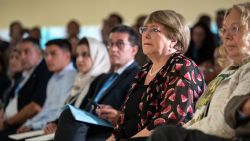It’s been four years since a committee of United Nations experts called attention to “credible reports” that more than 1 million Uyghur and other Muslim minority peoples were interned in extrajudicial campsin Xinjiang in northwestern China for “re-education” and indoctrination.
But since that moment in August 2018, the international community has done little on the basis of those reports within the UN: Countries in the UN’s main human rights body have not agreed to any formal call for a probe, while appeals from UN experts for China to allow for rights monitoring have been met with fierce denials of wrongdoing from Beijing and no invite for free access to come see for themselves.
Now, a report by UN High Commissioner for Human Rights Michelle Bachelet could bolster the push for accountability and elevate the voices of survivors and their families in a way the UN system has not previously done – creating the potential for a turning point for how the international community, and top UN officials, have handled these accounts.
But the report itself appears to be bogged down in review, following what’s already been months of delay, with Bachelet on Thursday saying her office was “trying” to release it before the end of her term on August 31 as promised in June, but they were still reviewing “substantial input” from China, which she said was granted access to make “factual comments” as per standard procedure.
How impactful that report will be also depends on its contents, Bachelet has already been accused by human rights groups and academic experts of being soft on Beijing after a controversial visit to China earlier this year.
Releasing a strong report – and acting on it – would mean going up against China, which has amassed what multiple UN insiders and experts call significant power among countries within the UN system, built by leveraging its economic might and championing an alternative vision of human rights – as well as systematically pushing back on any effort, however small, to challenge its human rights record, including the High Commissioner’s report.
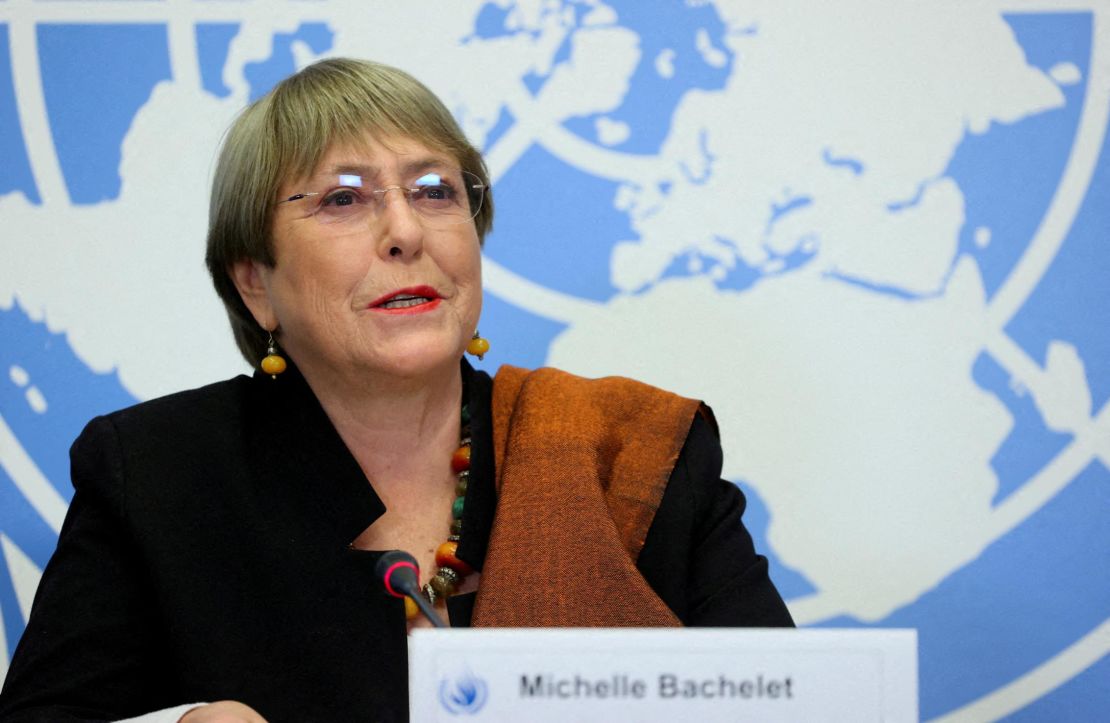
Earlier in her term,Bachelet said she sought “full access to carry out an independent assessment of the continuing reports pointing to wide patterns of enforced disappearances and arbitrary detentions,” but while she did not gain unfettered access in her eventual trip this past May, she has said the report was updated following that trip.
China’s Foreign Ministry has already publicly decried the report, with a spokesman late last month calling on the High Commissioner’s office to “respect the serious concern of the Chinese people and everyone speaking for justice in the world, stand on the right side of history and reject publishing an assessment on Xinjiang based on false information and false accusations.”
The spokesman did not confirm if Beijing had seen the forthcoming report at that time or elaborate on which parts he believed would be “false,” though China has patently denied all rights abuses. Bachelet on Thursday said the report “looks in depth” at allegations of “serious human rights violations.”
Battleground UN
For years, China has held significant sway over how the UN could approach allegations of major rights violations against Uyghurs and thecountry’s other Muslim minorities, wielding its economic and political clout to push back against a growing body of journalistic reporting, academic research and survivor testimony, people with knowledge of activities within the international body say.
At the Human Rights Council, the UN’s foremost rights body, Beijing rigorously works to counter efforts by countries to call it to account, using “incessant lobbying” and leverage such as access to vaccines, according to a Geneva-based Western diplomat.
“There are a lot of countries who are going to be worried by Chinese reactions or (fall) prey to Chinese lobbying,” the diplomat added, describing this as a key reason why a majority could not be reached in the council to establish a probe.
A rotating body of 47 nations elected from each of the world’s regions, the council can agree by consensus or majority vote on resolutions to establish investigative mechanisms like those launched to look into alleged violations in places like Myanmar, Libya and, more recently, Ukraine.
Instead, joint calls from dozens of countries presented at the human rights council for China to uphold its rights obligations and allow independent observers to enter Xinjiang have been countered by Beijing-aligned blocs of even more states with their own message: “Hong Kong, Xinjiang and Tibet related issues are China’s internal affairs.”
The situation “clearly is an outlier,” said Stephen Rapp, a former war crimes prosecutor and US ambassador-at-large for global criminal justice. “And that is a reflection, not of the evidence, but of China’s political power.”
“There is far more than the necessary credible evidence to justify a human rights inquiry … and (the evidence) is stronger and more widespread, with a larger number of victims than multiple situations where there have been overwhelming votes to establish commissions of inquiry,” he added.
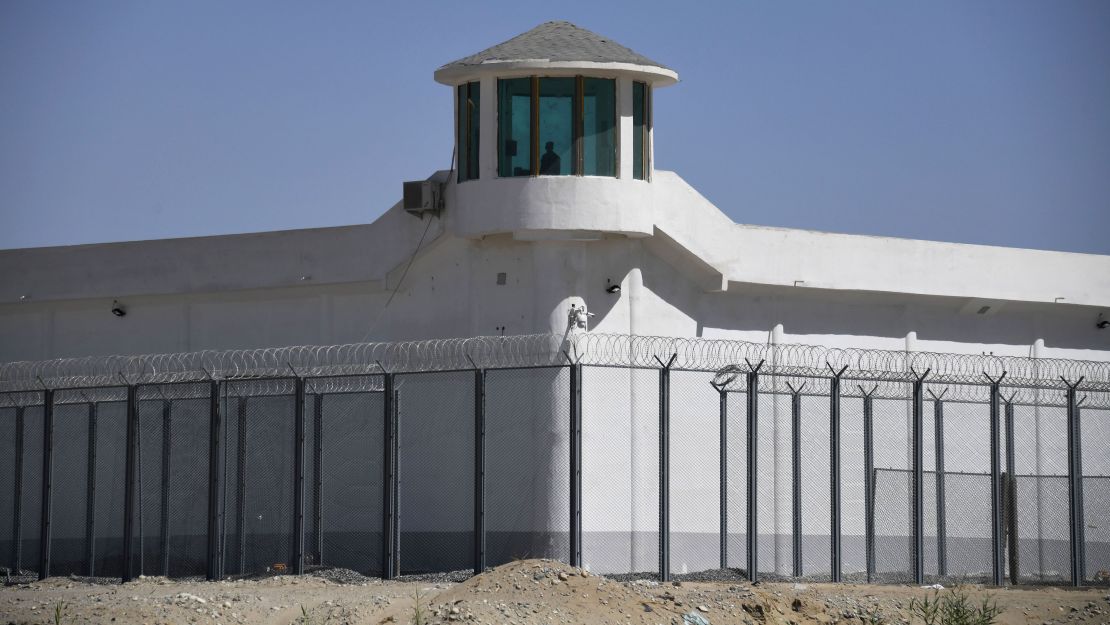
The allegations are that China has interned more than 1 million Uyghur and other Muslim minorities across all ages and walks of life in a network of heavily fortified detention centers and re-education camps, where there are reports of torture, sexual violence and forced sterilization.
While exact figures for how many in Xinjiang, home to 11.6 million Uyghurs, have been affected are difficult to assess, the “Uyghur Tribunal,” an international group of attorneys, academics, and NGO representatives, in 2021 said hundreds of thousands of Uyghurs – with some estimates well in excess of a million - have been detained, a finding that’s also been cited by the US State Department. The Committee on the Elimination of Racial Discrimination, which reports to the UN, also stated a similar scale of impact on the population in their 2018 statement, citing “numerous reports.”
Multiple governmental bodies have condemned the alleged abuses in recent years, with the European Parliament in June saying evidence constitutes “a serious risk of genocide,” a term the US has also used.
China, which originally denied the existence of the camps, later said it had established “vocational education and training centers” as a way to counter “extremism” in a region where ?ethnic riots in 2009 resulted in the deaths of 197 people, according to officials, and there have long been Communist Party fears about terrorism and separatism.
Beijing has called allegations of rights violations, genocide and forced labor in the region “the lie of the century.” In May, during Bachelet’s official trip to China – the first by a top UN rights official in 17 years – the high commissioner said the government assured her the “vocational education and training center” system was “dismantled.”
But academics and advocates say the oppression goes on, though it is now being absorbed into the prison system and transformed into a forced labor apparatus and a culture of fear and surveillance.
A spokesperson for the Permanent Mission of the People’s Republic of China to the United Nations in Geneva said in an emailed response to CNN that during her visit to China, Bachelet “observed with her own eyes China’s human rights path and achievements. She experienced in person what a real Xinjiang is like: a region that enjoys security, social stability and good development, and its people live and work in peace and happiness.”
“China firmly opposes the attempt to smear and attack China by fabricating disinformation. The just position of China has gained strong support of the international community. The attempt of a small number of countries to use Xinjiang-related issues to carry out political manipulation, tarnish China’s image and contain and suppress China is doomed to fail,” the spokesperson said.
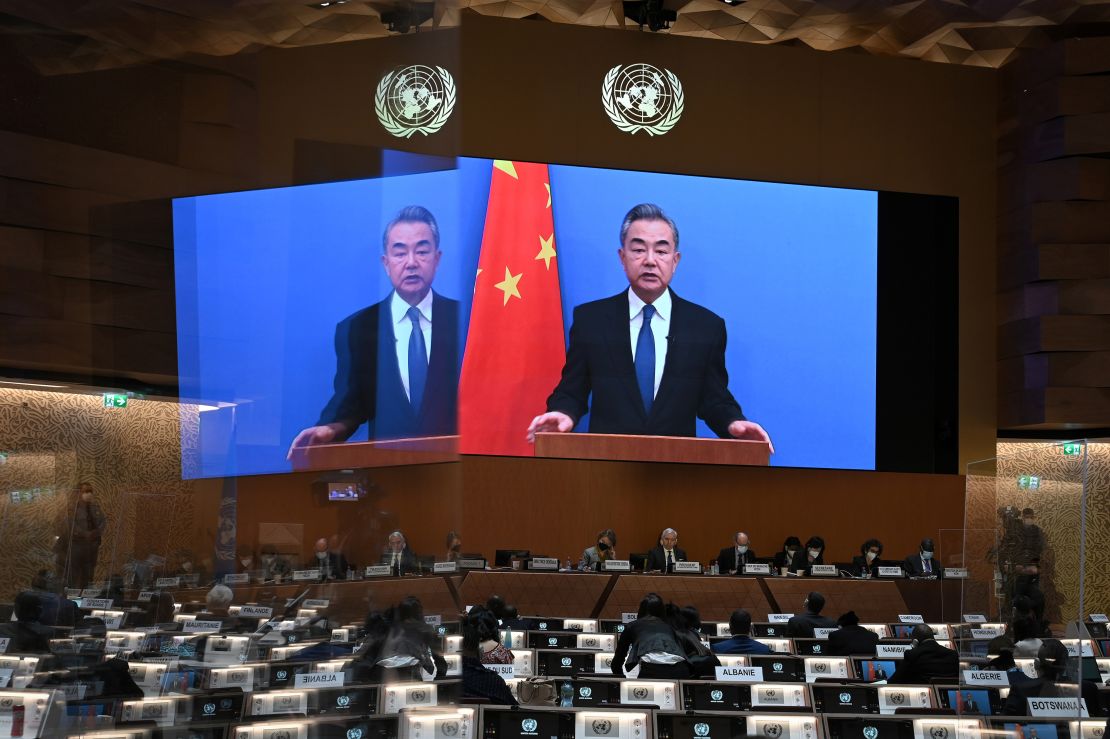
Beijing has previously said “respecting and protecting freedom of religious belief is the basic policy of the (Chinese Communist Party) and the Chinese government” and that the religious believers and non-believers “enjoy the same political, economic, social and cultural rights.”
“The claims of ‘genocide,’ ‘forced labor’ and ‘religious oppression’ are sheer lies,” China’s Foreign Minister Wang Yi said to a Human Rights Council meeting in February. “Xinjiang’s door is open, and we welcome people from all over the world who harbor no bias to come to Xinjiang for visits and exchanges.”
China is far from alone in seeking to use its influence and diplomacy to block criticism and investigation of its rights record in the UN, and powerful countries can typically be difficult to hold to account, but it is among the more effective and singularly focused in its pushback, observers say.
It has also linked its efforts to a larger struggle over the purpose of the UN itself, as far as how countries should monitor and hold each other to account.
“Sure, there’s elements of coercion, diplomatic lobbying, alliances, et cetera, but there’s also, deep down, different conceptions of human rights,” Frédéric Mégret, co-director of the Center for Human Rights and Legal Pluralism at Canada’s McGill University.
“(China) will emphasize ‘constructive dialogue,’ (as in) states between themselves should engage in constructive dialogue and make polite suggestions, but they should not be finger-pointing, they should not be laying blame,” he said.
Imminent report
Even as different visions for the UN and its Geneva-based Human Rights Council play out within its halls, several UN insiders and legal experts CNN has spoken with say how the UN responds to these allegations is a test of its credibility as a rights protector.
“Our view, and the view of a number of countries that share our concern, is that when we look back a decade or more from now, if nothing happens (at the UN), we will see this as the largest unaddressed human rights catastrophe of the past 20 years,” a second Western diplomat in Geneva told CNN.
“The gap between the scale and the scope of what’s going on and the extent to which it has been publicly, officially and formally dealt with (at the UN) is truly remarkable. We are very conscious of this,” said the diplomat.
The deadlock between countries in the Human Rights Council over how to respond to the allegations is one reason why those who have sought to hold China to account – including the overseas family members of Uyghur people in Xinjiang– are closely watching the release of Bachelet’s report.
“My sense is that many diplomats are waiting for that report. Once it does come out I could see them rallying and pointing to the UN’s own report in order to say, ‘we cannot look away from this evidence from the very institutions that we are part of,’” said human rights lawyer Rayhan Asat, who is the sister of Uyghur entrepreneur Ekpar Asat who has been detained and then jailed in Xinjiang since 2016, according to Amnesty International.
In September 2021, Bachelet said her office was “finalizing its assessment,” while a spokesperson in December said they hoped to publish in the coming weeks.
When asked during a press conference Thursday why the report was delayed, Bachelet said she “wanted to prioritize” visiting the country and “convey directly those allegations” to officials – and her office in early March reached an agreement with Beijing for a visit.
The trip, which shedescribed previously as “an opportunity to hold direct discussions,” not the investigatory mission she had long called for, was decried by advocates and leading scholars on Xinjiang at the time.
In the wake of that visit, more than two hundred Uyghur, human rights and interest groups jointly called for her resignation and several dozen leading scholars slammed her for “ignor[ing] and even contradict[ing]” academic consensus about violations in the region. A group of UN independent experts acknowledged dialogue with the Chinese government has merit, but stressed it could not “replace the urgent need for a complete assessment of the human rights situation in the country.”
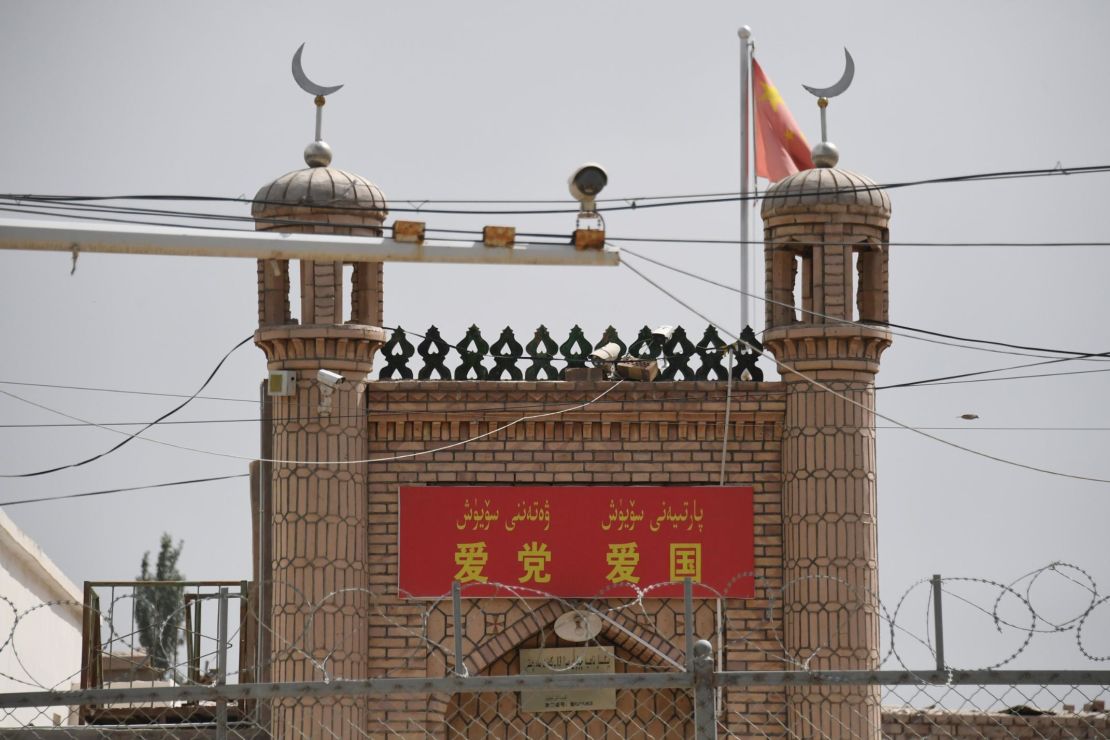
Bachelet discussed the visit during a session of the Human Rights Council in June, when she said she was not able to speak to any Uyghurs currently detained or their families during the visit, and added there were “limitations” due to China’s Covid protocols.
“I have always emphasized the importance of dialogue in my engagement with all member states, even on the most difficult issues,” she said of her visit to China during a June 13 address, in which she also announced she would not seek a second term due to personal reasons.
Bachelet said she met with senior leaders and officials and “raised concerns regarding the human rights situation of the Uyghur and other predominately Muslim minorities in Xinjiang, including broad arbitrary detention and patterns of abuse both in the VETC (vocational education and training center) system and in other detention facilities.”
She also mentioned “frank exchanges” with survivors and civil society representatives “including outside the country” whose information and perspectives are “vital.”
When asked this week if she had been under pressure regarding the report’s publication, Bachelet said her office was “always under pressure, from various sides, from all sides I would say, in all situations … but our work is guided by human rights methodology and the facts on the ground, and objective legal analysis.”
“I have been under tremendous pressure to publish or not to publish, but I will not publish or withhold information due to any such pressure,” she said.
When asked by CNN, Bachelet pushed back on suggestions that the report’s delay has been due to external pressure from the Chinese government.
“That is not the way we decide how we work. We follow our own human rights procedure and our own human rights methodology and no pressure will make any change on our decisions,” she said.
Adrian Zenz, a leading researcher on Xinjiang who was involved in the publication of caches of leaked documents that have provided extensive detail about the operations of the detention systems, said he was contacted by Bachelet’s office regarding his research and that her research team appeared to be skilled and “highly informed.”
But how that translates into a report is another question. Experts say the standard for verification of specific claims is high for such reports, while key details like scale of atrocities may be difficult to corroborate – especially as China has blocked all meaningful access for investigators, and those with direct knowledge may fear retribution from Beijing for going on the record.
Many observers say that even a strong report from the High Commissioner would be unlikely to change the reality of China’s sway in the UN system, where Beijing’s emissaries have recently solicited support among countries for a letter calling on Bachelet not to release the document, according to a report from Reuters?, who saw a letter from Chinese officials and confirmed by diplomats from three countries who received it.
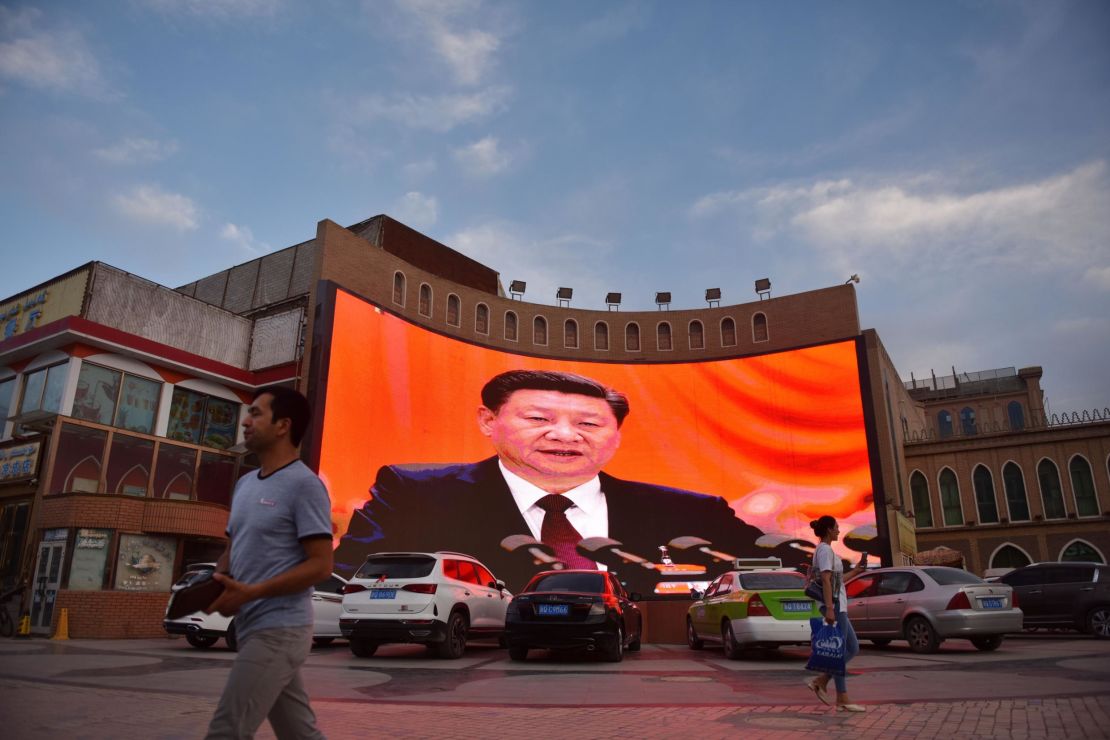
What comes after the report remains uncertain. Even if a majority of countries were to vote to establish a formal probe, there’s no mechanism to compel China to comply – and a number of countries have denied UN access in other cases. Beijing has also ignored international decisions in the past, for example dismissing an international tribunal ruling against its claims in the South China Sea.
“But the point is that the UN plays an important role as a catalyst in other ways,” Philip Alston, a professor of law at New York University and former UN Special Rapporteur, said. “If the report is strong, it greatly helps the Uyghur campaigns in various places around the world, it should spur at least some key governments to take a stronger stand, and it would ideally persuade the Chinese that they need to further ameliorate their policies.”
For others, as the clock ticks down to its expected release, it’s also a reminder of how much time has already passed.
“It’s hard to reconcile the (the UN response) with the urgency that I feel as a direct member of the family,” Asat said.
“You start to question the integrity of the system as a whole, but you also must still try to find a way, ultimately, to work within the system,” she said. “Because whether we like it or not, this is the only body we have.”
CNN’s Emmet Lyons and Henry Hullah contributed to this report.

